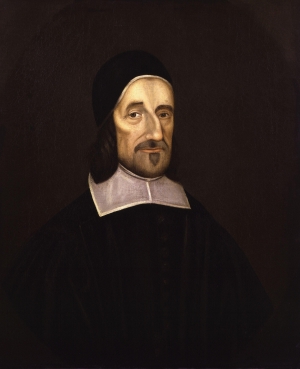Others, like the sacramentarians, (those are justly called sacramentarians, who attribute to the sacraments what they do not contain, and by high-sounding but false and made-up promises, lead men away from simple trust in the one God to belief in the power . . . Continue reading →
History of Reformed Theology
In Praise Of (Renaissance) Humanism
In article 10 he defined the literal sense just as most traditional evangelical and Reformed interpreters would: the sense intended by the author. This is an important correction to the late-modern subjectivist move to elevate the reader and his subjective experience of the text over authorial intent. Thomas represents a broad classical and Christian consensus about how to regard authors and texts. Augustine had argued that reading a text according to the author’s intent was an act of charity, a way to love one’s neighbor as one’s self. Continue reading →
The Reformed Churches: We Distinguish But Do Not Separate The Two Natures Of Christ
Question 17. Why must he in one person be also very God? That he might, by the power of his Godhead, sustain, in his human nature, the burden of God’s wrath; and might obtain for and restore to us, righteousness and life. . . . Continue reading →
Muller On The History Of The Exegesis Of Hosea 6:7
Adam in Hosea 6:7: generic or specific? An example of a different order is the exegesis of Hosea 6:7, where the medieval tradition had rested unquestioningly on the Vulgate rendering, “ipsi autem sicut Adam transgressi sunt pactum.” The text indicated, as virtually . . . Continue reading →
Is Infant Baptism A Roman Catholic Leftover?
Like a growing number of people in the Reformed churches I did not begin my Christian life there. I began my Christian life in an evangelical (Southern) Baptist setting. As part of my initiation into that culture I was given an explanation . . . Continue reading →
The Consensus Of The Divines, Legalism, And The Covenant Of Works
The charge of legalism against the covenant of works is one of those allegations that seems persuasive at first because we all know that legalism is bad and that grace is good. It is almost instinctive to react to the charge by asserting the graciousness of the covenant of works. That is a trap, however, into which we ought not step. Continue reading →
The Martyrdom Of George Wishart 1 March 1546
On the sixteenth day of January, 1546, the Regent and cardinal arrived after night-fall at Elphingston Tower, in the neighbourhood of Ormiston, with five hundred men, and despatched the Earl of Bothwell to apprehend Wishart, holding themselves in readiness, if need were, . . . Continue reading →
God’s Love Does Not Change Him Or In Him But It Does Change Us
The effect or manner of God’s love is, that God makes the person happy whom he loves. For he doth amply reward that joy and delight which he takes in the holiness and obedience of the Elect, while he pours plentifully upon . . . Continue reading →
Sibbes: Our Communion Was First Founded Upon A Covenant Of Works
This communion and fellowship of man with God, was first founded on a covenant of works made with Adam in paradise. If he did obey, and did not eat of the forbidden fruit, he should have life both for himself and his . . . Continue reading →
Three Things Dispensational Apologists Should Stop Saying
There are varieties of Dispensationalism, e.g., classic (Darby, Scofield), modified (Chafer, Ryrie), and progressive (Bock, Blaising). To be sure there are varieties of covenant theology, e.g., classic e.g., that taught in the classical period that taught the covenant of redemption (pactum salutis), . . . Continue reading →
Ball: The Covenant Of Works Conditioned Upon Perfect Obedience In His Own Person
The Covenant of Works, wherein God covenanted with man to give him eternal life upon condition of perfect obedience in his own person. The Covenant of Grace, which God made with man promising eternal life upon condition of believing…This Covenant [of works] . . . Continue reading →
Review of J. I. Packer, Puritan Portraits
J. I. Packer is a significant figure in a variety of circles. He is one of the last voices representing that generation of British evangelicalism that had roots in the Reformation, that was articulate, warm, and evangelical in the best sense of . . . Continue reading →
Nicole: What Happened To Amyraldianism?
France. As may be gathered from the above account, the influence of Amyraut was constantly on the increase between 1637 and 1659. At first, only a few provinces and the Church of Paris supported him, and there was resolute opposition in many . . . Continue reading →
Nicole On Phase 3: The Revenge Of The Amyraldians
In 1655 two works appeared in print in Amsterdam from the pen of Parisian pastors who had supported Amyraut from the start: David Blondel (1590–1655) produced a very partisan account of the course of events in the controversy, with supporting documents subjoined, . . . Continue reading →
Nicole On Phase Two: Opposition To Amyraut Builds
In 1641, Amyraut took the pen to defend Calvin’s view of reprobation, which had been severely criticized in an anonymous work. In this volume, titled Doctrinae J. Calvini de Absoluto Reprobationis Decreto Defensio, Amyraut took occasion to reassert covertly his main positions . . . Continue reading →
Roger Nicole On Amyraut’s Testimony At Alençon (1637)
1. Naturally enough, in the explanations they gave, Amyraut and Testard sought to conform their presentation and language as closely as they could to the traditional Reformed views without making an outright disavowal of their previously printed sentiments. It would be difficult . . . Continue reading →
Burying The Lead On Baxter
There is a phrase in journalism called “burying the lead” (or, since about 1979, the cloying variant lede). The lead (lede) is the paragraph in which the most important, salient facts are contained. In the old days (c. 1975), the writer was . . . Continue reading →
Bavinck: Amyraldianism A Species Of Rationalism
In Calvin, these two perspectives are still connected with each other, but in Reformed theology they soon split apart, and both developed in a one-sided direction. Under the influence of Socinianism and Remonstrantism, Cartesianism and Amyraldism, there sprang up the neonomian view . . . Continue reading →
Warfield: The Westminster Excluded Amyraldianism
The interest of the debate to us lies in the revelation which it gives us of the presence in the Assembly of an influential and able, but apparently small, body of men whose convictions lay in the direction of the modified Calvinism . . . Continue reading →
Charles Hodge Contra Amyraut
According to the common doctrine of Augustinians, as expressed in the Westminster Catechism, “God, having … elected some to everlasting life, did enter into a covenant of grace, to deliver them out of the estate of sin and misery, and to bring . . . Continue reading →






